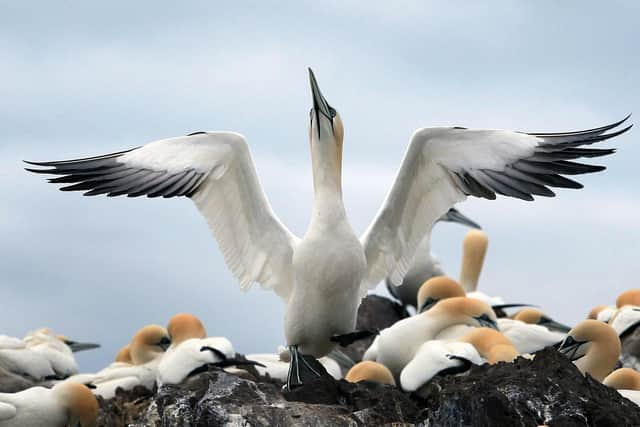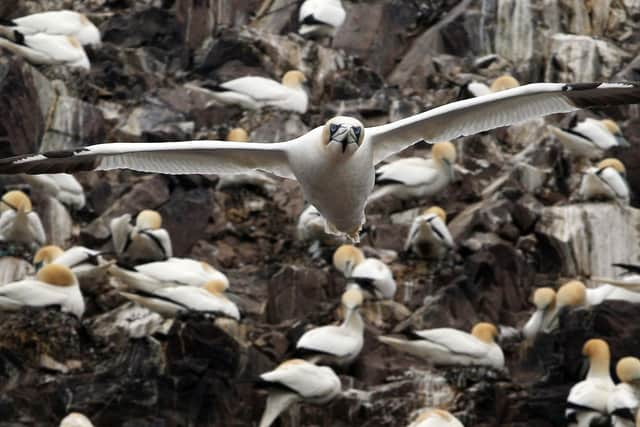Bird flu Scotland: What is bird flu? How bad is the current outbreak in Aberdeenshire? Could bird flu affect humans?
What is bird flu?
Avian influenza, more commonly known as bird flu, is a highly contagious viral disease affecting the respiratory, digestive and/or nervous system of many species of birds.
There is evidence it can be passed on to some animals and humans, though there is a much lower risk of this.
Advertisement
Hide AdAdvertisement
Hide Ad

What impact is bird flu having right now?
Highly pathogenic avian influenza (HPAI) – the most serious strain of bird flu – is a regular occurrence in the UK.
Professor Gideon Henderson, from the Department for Environment, Food and Rural Affairs (Defra), said Britain, however, is in the midst of the largest outbreak ever seen in this country, and an unusually severe global pandemic across bird populations.
Last summer, a record number of bird flu cases were confirmed. Infections have been at their highest level ever during the winter of 2022 to 2023.


HPAIV has negatively impacted wild and domestic bird populations globally for decades. However, the existing strain – HPAIV H5N1 – has seen shifts in both the timings of outbreaks and species affected, including seabirds.
Northern gannets appeared especially severely impacted, but there was limited understanding of how their populations were affected.
Where are the current outbreaks in Scotland?
Two sites near Fraserburgh in Aberdeenshire had confirmed cases on Monday, August 19.
A premises near Kirkcudbright in Dumfries and Galloway had cases confirmed on Monday, August 19.
A site in In Lochcarron, Highland, had cases confirmed on August 9.
Advertisement
Hide AdAdvertisement
Hide AdA premises near Portsoy, Aberdeenshire, had cases confirmed on August 8.
Cases of the virus were detected at a site near Stornoway on the Isle of Lewis on August 8.
Protection and surveillance measures are in place in all the premises listed above.
A site in Peterhead, Aberdeenshire, had cases confirmed on 15 July.
A premises near Forres in Moray had cases confirmed on June 23.
Both sites listed above were deemed special category premises due to its non-commercial nature. As a result of this and based on a veterinary risk assessment, no new disease control zones have been applied
Can bird flu be passed onto humans?
Amid outbreaks worldwide, three UN agencies warned this week that an ongoing rise in avian flu outbreaks globally raised concerns the virus might adapt to infect humans more easily.
They have urged countries to strengthen disease surveillance and improve hygiene at poultry farms. However, only about half a dozen cases in people who had close contact with infected birds have been reported to the World Health Organisation (WHO), and most of those have been mild.
Advertisement
Hide AdAdvertisement
Hide AdWHO’s director of epidemic and pandemic preparedness and prevention Dr Sylvie Briand has previously said: “We encourage all countries to increase their ability to monitor these viruses and to detect any human cases.”
What is the current safety advice on bird flu in Scotland?
Do not pick up or touch dead or sick wild birds.
Keep pets/dogs away from any dead or sick birds.
Do not feed wild waterfowl.
Do not touch wild bird feathers or surfaces contaminated with droppings.
If you find a live sick bird, call the Scottish SPCA on 03000 999 999 – but do not take it to one of the charity’s animal rescue and rehoming centres.
If you keep poultry or other birds, it is vital that you wash your hands and clean and disinfect your footwear before tending to any animals.
Sightings of dead birds can be reported via the UK Government website or by phoning the Department for Environment Food and Rural Affairs (Defra) helpline on 03459 33 55 77.
Some recent scientific discoveries about the virus
Scientists have discovered evidence that northern gannets can recover from bird flu and that unusual black iris coloration is linked to a previous HPAIV infection.
Black irises – instead of the bird’s usual pale blue – were first seen in gannets breeding on the Bass Rock in June last year, with colour varying from completely black to mottled. Researchers took blood samples from 18 apparently healthy adult gannets with both normal and black irises, which were tested for bird flu antibodies by the Animal and Plant Health Agency (APHA) to determine whether the birds had been previously infected. Eight tested positive, of which seven had black irises.
The study also assessed the impact of HPAI on adult gannet survival at the largest gannet colony in the world – the Bass Rock, off Scotland’s coast. The team found at Bass Rock, adult survival between 2021 and 2022 was 42 per cent lower than the average over the previous ten years.
Comments
Want to join the conversation? Please or to comment on this article.